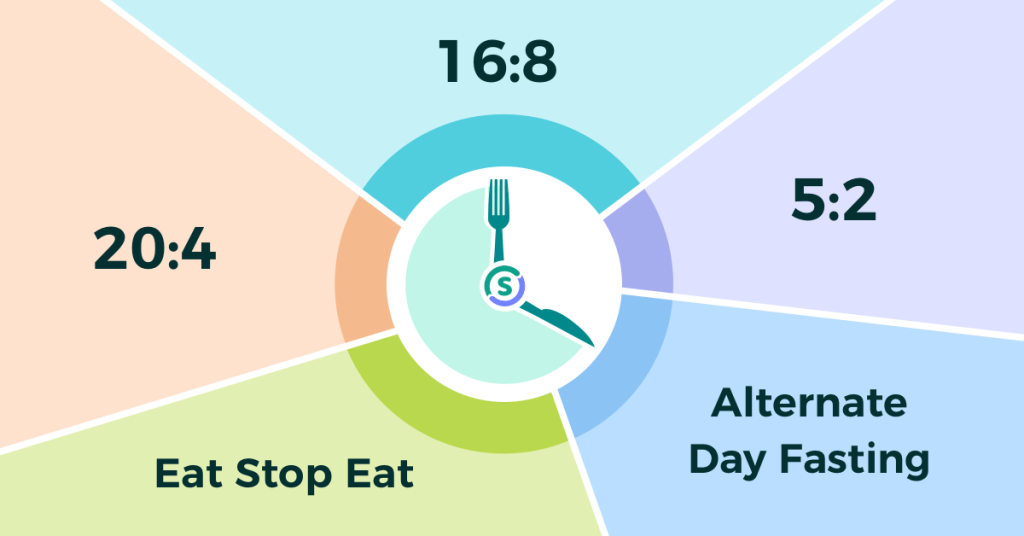Intermittent fasting has emerged as an effective eating pattern that not only helps in weight loss but also delays aging, maintains a healthy lifestyle, and ensures longevity. If the benefits of intermittent fasting tempt you and you want to explore intermittent fasting in depth, we have covered you in this ultimate guide.
In it, we will delve into the intermitting fasting meaning, its different types, and its plethora of life-changing benefits. So, without any further delay, let’s begin the journey of exploration!
What’s Intermittent Fasting?
Intermittent fasting is the eating pattern that switches between the periods of fasting and eating. Where every other diet focuses on what you eat, intermittent fasting is all about when you eat. The best part about intermittent fasting is its different types, ranging from 12/12 to 20/4, 24 hour fasting, and more.
You can opt for one that best suits you. Additionally here is a brief explanation of the most common methods of intermittent fasting:
- 12-Hour Fast: This method involves fasting for 12 hours each day. The fasting period typically includes the time spent sleeping, making it an accessible option for beginners.
- 16/8 Method: This involves fasting for 16 hours each day and eating during an 8-hour window.
- 18/6 Method: This involves fasting for 18 hours each day and eating during an 6-hour window.
- 20/4 Method: This involves fasting for 20 hours each day and eating during an 4-hour window.
- 5:2 Diet: With this approach, you eat normally for five days of the week and restrict calorie intake to 500–600 calories for the other two days, which are non-consecutive.
- Alternate-Day Fasting: This method involves alternating between days of normal eating and days of fasting or significant calorie reduction.
- 24-Hour Fast (Eat-Stop-Eat): This involves fasting completely for 24 hours once or twice a week, from dinner one day to dinner the next day.

I personally prefer the 16/8 intermittent fasting method which includes an eight-hour eating window each day and a 16-hour fasting span. The 18/6 method is similar, however in this method you have a 6 hour eating window each day and an 18 hour fasting window. 18/6 is definitely more suited to experienced fasters!
Exceptional Health Benefits of Intermittent Fasting
By now, you have explored intermittent fasting in its different forms. Let’s now examine its science-backed health benefits.
Weight Loss
Are you struggling to lose weight and finding it hard to be consistent with a strenuous weight loss routine? I have found this to be one of the main benefits of intermittent fasting. With this approach, you eat fewer meals, and your calorie intake decreases significantly. Moreover, this form of fasting lowers insulin levels and increases norepinephrine and HGH (Human Growth Hormones) levels. All these hormonal changes contribute to breaking down fat and utilizing it for energy.
Though it doesn’t seem as effective as typical calorie restriction techniques, it’s easier to practice long term. Moreover, a trial from 2017 offered a comparison of calorie restriction and intermittent fasting, revealing that both are equally effective in weight loss.
Reduces the Risk of Type 2 Diabetes
Type 2 Diabetes refers to the issues our body faces in regulating and using blood sugar. In general, anything that could reduce insulin resistance can prevent this disease and you can get the exact advantage from intermittent fasting for diabetes. In 2022, a review was conducted on ten studies, revealing that fasting can reduce blood sugar by an average of 0.15 millimoles/liter.
Moreover, another study on mice with diabetes concluded that intermittent fasting has improved the overall survival rates, offering optimal protection against diabetic retinopathy—a diabetic complication that causes blindness.
Minimizes Inflammation and Oxidative Stress
Oxidative stress is a major factor contributing to several chronic diseases again. In it, the super-reactive unstable molecules, called free radicals, reach the important molecules of our body, like DNA and protein, damaging their structure. Aside from tissue damage, its oxidative stress also causes diabetes mellitus.
According to a 2018 study, intermittent fasting can improve your body’s resistance to oxidative stress. Moreover, it also helps relieve inflammation, which has the potential to cause metabolic syndrome, escalating the risks of obesity, heart disease, and type 2 diabetes.
Triggers Cellular Repair
During fasting, our bodies begin removing cellular waste, i.e., autophagy. This involves cells’ breakdown and metabolization of dysfunctional proteins that build up over time. This removal of waste might offer protection against conditions like Alzheimer’s. An animal study concluded that intermittent fasting also prevents the onset of neurodegenerative conditions like Huntington’s and Parkinson’s.
Improves Longevity
As backed by animal studies, intermittent fasting can ensure longevity in humans, as does long-term calorie restriction. A study on mice revealed that alternate day fasting ensures 13% longevity by reducing the risk of multiple deadly diseases, ensuring weight management, etc. Another study supported this stance by concluding that intermittent fasting can delay several diseases caused in aging mice, like fatty liver diseases. However, more studies and research are required to link this benefit more clearly with humans.
Prevents Cancer
Multiple studies have backed the role of intermittent fasting in delaying the onset of tumors. As intermittent fasting ensures weight loss, it helps defeat obesity, a risk factor for various cancers. It also helps cope with other cancer-causing agents, like increased inflammation and insulin levels.
Note: The direct link between cancer and intermittent fasting is still unclear. Further research must be done in support of this claim to prove its effectiveness.
Wrapping Up the Benefits of Intermittent Fasting!
Intermittent fasting involves following specific eating patterns and switching between fasting and eating spans over an elongated span. The benefits of intermittent fasting are endless. This brings many benefits, including weight loss and preventing certain diseases, like diabetes type 2, cancer, etc.
Other benefits of intermittent fasting include reducing oxidative stress, ensuring longevity, and more. In short, intermittent fasting can unlock doors to life-changing benefits. So, why not give it a try?
Pro Tip: Start with small steps, try a 12 hour fast at first, finish your last meal by 7pm and don’t eat again until 7am the next day. Only drink water, clear tea or black coffee. Once you are comfortable with this extend it out to 8am the next day before eating, gradually extending until you reach 16 to 18 hour range. You will find over time you won’t even be hungry in the mornings and welcome the time back from having to make and eat breakfast!
FAQs

Can You Drink Water While Intermittent Fasting?
Yes. You can drink water to stay hydrated during intermittent fasting. Intermittent fasting is a general eating pattern that restricts you from eating any meal in a specific span; there isn’t any prohibition on water intake. Still, you should avoid sweeteners, flavors, etc., to support your weight management.
What Can You Drink During Intermittent Fasting?
You are allowed to sip drinks with minimal calories, such as water, tea, black, unsweetened coffee, etc. Your goal must be to consume as few calories as possible during your fasting periods to get the maximum benefits of intermittent fasting.
Can You Drink Coffee During Intermittent Fasting?
You can drink black unsweetened coffee to ensure proper hydration with minimal calorie intake during fasting.
Is Intermittent Fasting Good for Diabetics?
As mentioned, intermittent fasting helps prevent type 2 diabetes by reducing insulin resistance. It also prevents diabetes mellitus by minimizing oxidative stress.
How Long Does Intermittent Fasting Take to Work?
No matter which diet plan or eating pattern you follow, you need to be consistent to observe visible results. The same is the case with intermittent fasting. According to experts, you will witness positive results if you consistently follow the basic rules for ten weeks.

